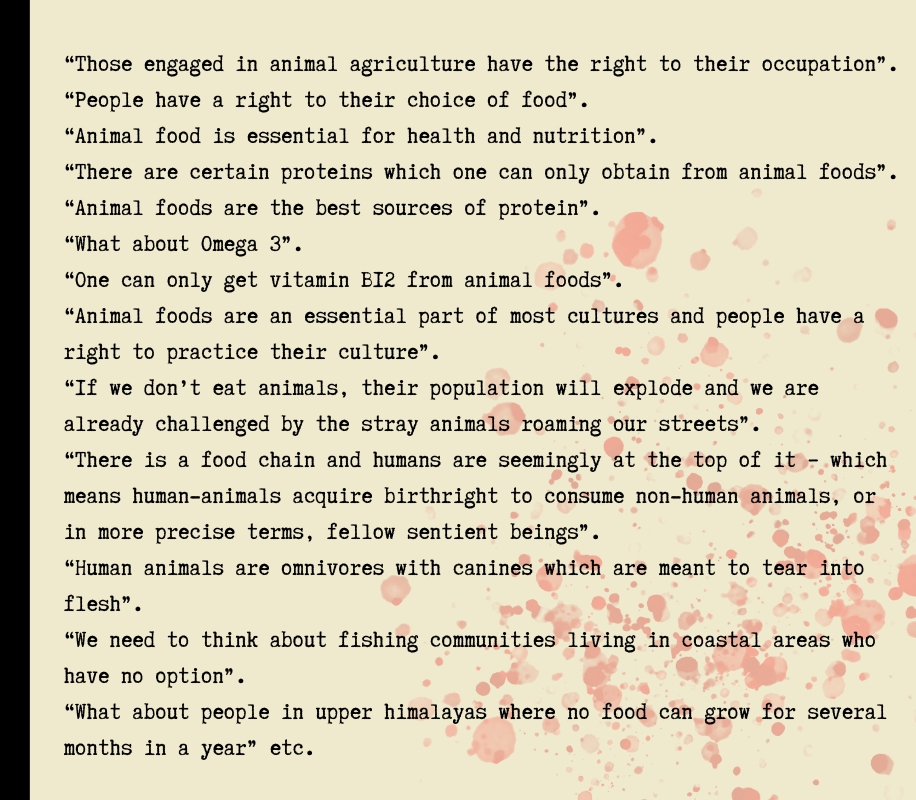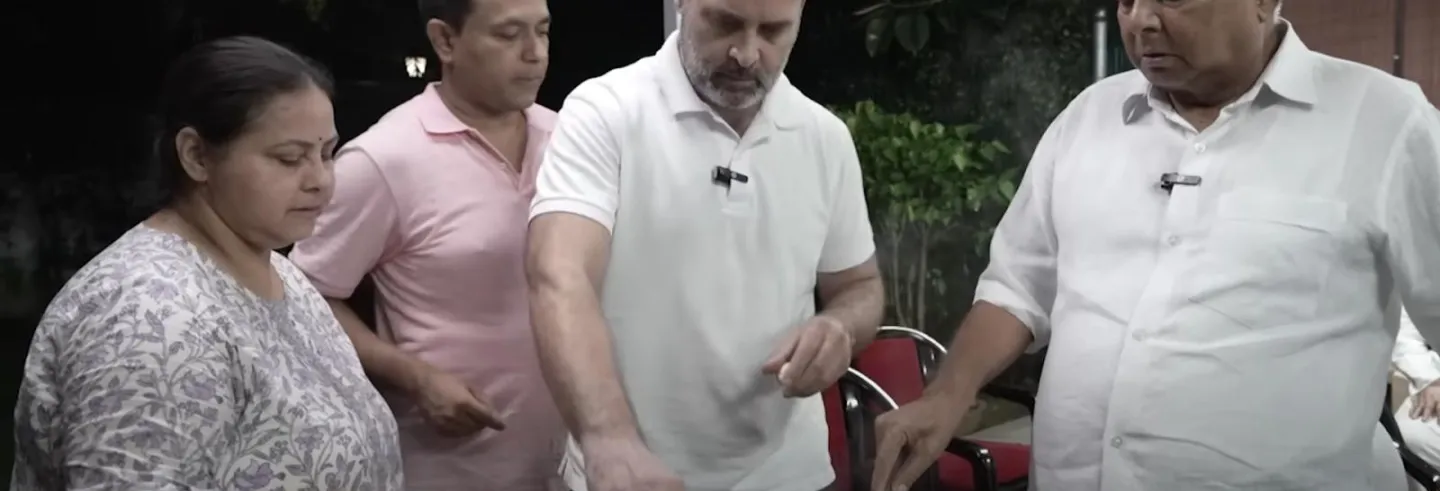Earlier this year, a video of Rahul Gandhi learning to make Champaran Mutton from Lalu Prasad Yadav went viral.
1The video received nearly 3.6 million views on a single platform (YouTube) in less than 4 weeks.
Gandhi was praised by many for a ‘competing narrative’ to the imposition of a ‘Brahmanical’ vegetarianism by upper caste Hindus and, more recently, by the
Unlike in the West, vegetarianism in India is largely driven by concerns of purity and superiority rather than any ethical, moral concerns such as non-violence and the rights of animals. It is often a way to establish and maintain caste based social hierarchies, discriminate against, and exclude certain castes (and religions) from public spaces and common resources. The first decision of the new BJP government in Madhya Pradesh in December 2023 was to ban the sale of meat and eggs in public, without heed to the fact that almost half the state consumes meat. An even sharper line is drawn between those who consume beef (the meat of cattle) and those who do not.
Vegetarianism in India is largely driven by concerns of purity and superiority rather than any ethical, moral concerns such as non-violence and the rights of animals.
The celebration of non-vegetarianism is often a counter to the idea of supremacy and purity associated with
Any person who believes in the individual’s right to liberty and equality would condemn such discrimination and exclusion of one set of people by another set of people and would want to end it.
The message is supposed to be stronger when people of all castes and communities, celebrate and proudly partake in the consumption of beef – the form of meat for which people are not only discriminated but also lynched in India. For any thinking, sensitive human, the choice to abstain from violence to another human being would be a noble choice. On the other hand, it would be hard to fathom how the choice to indulge in wilful violence to another living – albeit non-human – being can be said to open vistas to a new kind of politics that is warm, inclusive, and loving. Can we fight oppression (based on caste and religion) with further oppression (of non-humans)? Is species-ism (establishing the superiority of humans over other species) the only way to fight casteism and communalism?
Animals and emancipatory politics
Contrary to what many people in India would like to believe, the animal food industry today is highly commercialised, industrialised, exploitative and brutal. We do know that animals who are raised for meat or dairy are kept in highly inhumane conditions. Barring the rare exceptions, even basic minimum standards of treatment as prescribed under animal welfare laws and policies are never abided by. The brutality of the industry is described by the work of Krithika Srinivasan, which challenges the dominant imagination of animal agriculture in India as being a home based, largely non-commercial, humane relationship where animals are treated like family by farmers.
The slaughter of cows and buffaloes is inextricably linked to the dairy industry.
The recognition of the rights of animals and extending non-violence to them makes it imperative to also reconsider dietary practices that are framed ‘pure’ and ‘vegetarian’.
While even the mention of beef stirs up violent sentiments amongst many Hindus, the same Hindus consider dairy consumption as their religious and cultural birthright. This is despite the fact that the slaughter of cows and buffaloes is inextricably linked to the dairy industry.
As Yamini Narayanan points out in her recent book Mother Cow, Mother India:Multi-species Politics of Dairying in India “the hyper-politicization of beef in cow protection discourses and practices obscures that the heavily state-subsidized dairy sector, India’s primary bovine industry, itself requires the slaughter of cows, buffaloes, sheep and other animals used for milk production. To acknowledge the role of milk in cow slaughter, however, places the Indian state in a fraught position.”
"India’s status as one of the world’s largest milk producers, beef exporters, and leather producers – industries that are substantially sustained by the mass slaughter of bovines – implausibly coexists with its legislative prohibitions on cow killing”.
Caste and religion-based violence and oppression are blots on our secular, democratic republic. But can we challenge the oppression of fellow human beings only through inflicting worse forms of oppression upon fellow sentient beings?
Animals have the same basic needs and desires as human beings. They need nutritious food, water and air to survive. They desire freedom, love, care, sex, fun and games, relationships, and good health – just as humans. They react to pain, violence, torture just as any human being. They are born from their mother’s womb, form bonds, breathe in and breathe out, have a brain and a nervous system, eyes to see, mouths to eat. Just like humans, all mammals drink their mother’s milk upon birth. They have emotions: joy, sadness, anger, fear. Some animals which we love on our plates are more cognitively developed than many
Rethinking diets
When liberal human beings are asked why they tend to support the enslavement, torture and violence when it comes to fellow sentient beings from non-human species, one is likely to come across several reasoned responses.

Animal-based foods are, possibly, the most popular and cheapest, source of proteins – particularly among the lower classes of Indians. Restrictions on meat, including on beef, will impact the protein intake of the poor. Bans on sale and consumption are not coupled with measures to supply other sources of protein. This is no surprise, because prohibitions on meat does not come from a sense of animal welfare or animal protection but from a place of superiority and corresponding contempt for the marginalised.
A policy that comes from the space of welfare towards both humans and animals could go a long way to cure widespread dietary deficiencies that prevail even amongst meat-eating Indians.
However, we must know that an alternative is possible. Plant based foods contain all nutrients which are essential for human growth and development – except for Vitamin B12. Even this is widely available today in the form of plant-based Vitamin B12 supplements – a month’s supply of which costs the same as a litre of milk.
A policy that comes from the space of welfare towards both humans and animals could go a long way to cure widespread dietary deficiencies that prevail even amongst meat-eating Indians. Nearly half of north India is deficient in B12 and as many as nine in 10 Indians are deficient in Vitamin D, also naturally found in animal products. These are damning numbers when we consider that over 90% of Indians consuming animal food.
Can we find ways to end caste and religion-based oppression in India from Mahatma Gandhi’s tools of non-violence?
Gandhi made many changes to his lifestyle in this attempt to practice non-violence upon other beings. One of the changes was to adopt a plant-based diet, giving up not only on animal meat but also on dairy products.
Gandhi believed that neither humans nor animals should be treated as commodities or as machines to be used for production. Instead, everyone must be able to realise their full potential. This is what led him to start the Champaran Satyagrah in 1917 where he fought for the rights of tenant farmers to grow what they wished. Gandhi made many changes to his lifestyle in this attempt to practice non-violence upon other beings. One of the changes was to adopt a plant-based diet, giving up not only on animal meat but also on dairy products (normally considered an intrinsic part of upper caste Hindu diets). When his health deteriorated, he began consuming goat’s milk but had regrets about it later.
Even so, Gandhi refused to lend his authority to demands that the Indian Constitution ban cow slaughter. He was a staunch Hindu who worshipped the cow, but he believed “It is obviously wrong legally to enforce one’s religious practice on those who do not share that religion.”
He was a constant and unwavering critic of the hypocrisy of Hindus who discriminated against Muslims for eating beef.
“The very Hindus who quarrel with the Muslims because they slaughter the cow for the beef she gives are not ashamed to accept the mastery of the English who are known to be beef-eaters in a sense in which the Muslims never are. I have no quarrel with the Englishmen because they eat beef and as such I have none with Muslims either. I am concerned with showing the great inconsistency of the Hindus who for the sake of money gladly serve their English masters and quarrel with the Muslims. Then we forget that there are Hindus who gladly partake of beef.”
For Gandhi, it was wrong to believe that someone was inferior for eating meat. Yet, as the historian Nico Slate, writes “There are many different ways in which the choices we make as eaters impact our world, and Gandhi believed very strongly in thinking really hard about how to make the world a better place through his diet”.
There lies his central message for both upper-caste Hindus who view those belonging to other castes or religions as ‘inferior’ or ‘polluted’ due to their choice of food, and for those who seem to miss out on the impact of his food choices on both animals and the environment.
The real test for practicing Hindus and for secular liberals would be to follow the footsteps of Mahatma Gandhi and start by being “alert to the most quiet anxiety, the most silent scream”: those coming from fellow humans as well as from rebellious, secular, anti-casteist food plates.
Anjor Bhaskar is faculty member at Azim Premji University, Bengaluru. The opinions here are personal are not endorsed by and do not reflect the view of the university.









